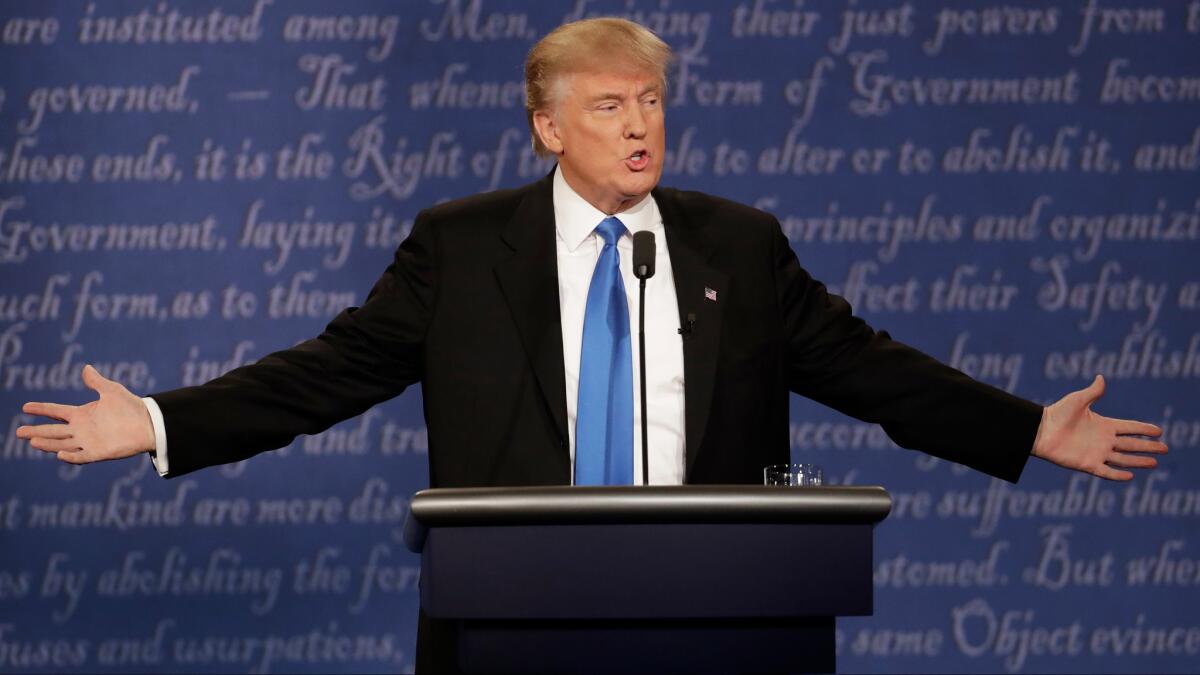Op-Ed: How do you stop Donald Trump from interrupting? Cut his mic.

Turn off the microphones.
That’s my solution for making the presidential debates more informative, more useful, pithier, wittier, shorter — better. When it’s not a candidate’s turn to speak, his mic should be off.
Every four years, from the Bush vs. Dukakis debates when I was a freshman debater in high school right up to Monday night’s Thrilla on Long Island, I have watched these presidential debates and wondered, “Why don’t they just turn off the candidates’ microphones when it’s not their turn to speak?”
The interruptions don’t serve anyone well — not the candidates, not the voters. They are bad for the interrupter, who comes off as boorish, and they are bad for the interrupted, who cannot finish his or her answer. Exchanges with lots of interruptions are rarely improved by all the crosstalk.
They also, as we learned Monday night, empower a bully, especially a male bully. Monday night, both candidates interrupted, but Donald Trump interrupted far more eagerly than Hillary Clinton did — 25 times in the first 26 minutes.
Clinton surely knew that a woman interrupting a man would be viewed less charitably, judged more harshly, than a man interrupting a woman. This asymmetry was a major structural advantage for Trump, and he used it.
Imagine if their microphones cut out when it wasn’t their turn — the candidates couldn’t talk over each other, they couldn’t butt in, couldn’t behave in ways considered impossibly rude in young children. Also, they couldn’t go over time. Maybe they’d get a 15-second grace period — just as in high school debate — but that’s it. No more. Hand motion across the throat. Mic out. Finis.
So turn off the microphones.
Of course, such a drastic measure should not be necessary. In other contexts, it isn’t. In my entire debate career, through high school and college and my years coaching at the university level — in the same league where Ted Cruz used to win trophies — I never once saw a debater keep talking when a judge said time was up.
Same thing goes in courtrooms, which aren’t exactly debates but are similar enough. If a lawyer is giving an opening or closing argument, and a judge tells her to wrap it up, she stops.
Of course, in those cases, there is a penalty to pay for talking out of turn. Debaters lose points; lawyers can be held in contempt. But voters don’t judge interrupting harshly enough, apparently. We look to debates for blood sport, and too often we pick the winner based on entertainment value. We’re not going to penalize candidates for interrupting or going on too long.
Another benefit to mic control: If candidates knew they had exactly two minutes — instead of however much they could get away with — they’d use their time more wisely. They wouldn’t make the rookie debater’s mistake of trying to answer every single one of the opponent’s points. They would strive for simplicity.
And they’d soon learn that brevity is their friend. They’d think in terms of cut-to-the-chase one-liners. As debaters know, the best defense is a good offense. Rather than endlessly defending themselves, they’d ask pointed questions: “Donald, is your Islamic State plan tucked into your tax returns?” “Don’t be coy, Donald — what were you going to say to me and my family?”
If the candidates didn’t modify their behavior — didn’t learn to fear the silenced mic — that would be even better. You think the Howard Dean scream was fun for desktop video wizards? Imagine what they’d do with the madly gesticulating candidates mouthing words nobody could hear.
Ah, the sound of silence.
Mark Oppenheimer, a contributing writer to Opinion, was (with Jed Shugerman) one half of the top American team at the World University Debate Championship in 1996.
Follow the Opinion section on Twitter @latimesopinion or Facebook
MORE FROM THE OPINION SECTION:
Clinton and Trump will be held to different debate standards, but that’s OK
Vote for Johnson, elect Trump. Clinton’s youth turnout problem and what Tom Steyer can do about it.
How Latino voters and legislators are changing California politics
More to Read
A cure for the common opinion
Get thought-provoking perspectives with our weekly newsletter.
You may occasionally receive promotional content from the Los Angeles Times.










